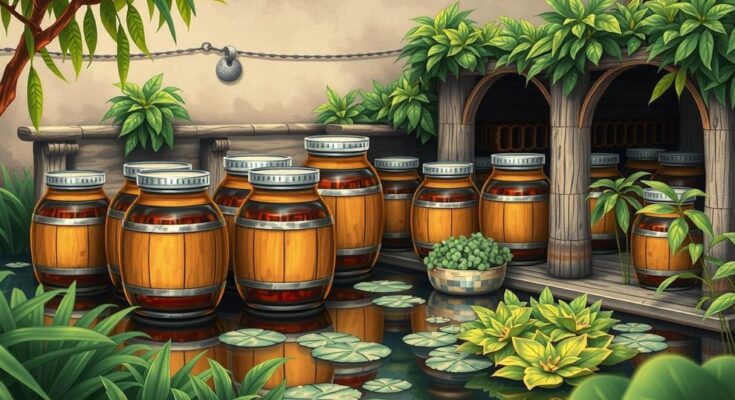Vietnam’s long-standing tradition of fish sauce production is jeopardized by climate change and overfishing. Bui Van Phu continues this legacy amid declining anchovy stocks critical for his business. The global fish sauce market is expanding, but challenges persist in sustaining this essential cultural product. Phu emphasizes the importance of preserving their craft as a part of Vietnamese heritage.
The tradition of producing fish sauce in Vietnam, specifically in the village where Bui Van Phong has operated for decades, faces significant challenges due to climate change and overfishing. Phong opted to remain in his village after the Vietnam War, continuing an ancestral legacy with his son, Bui Van Phu, who now leads the business. Recognized as part of Vietnam’s cultural heritage, fish sauce is not only valued for its flavor but also for its historical significance.
Factors such as warming oceans and reduced oxygen levels threaten the anchovy populations crucial to fish sauce production. Scientific studies suggest that as conditions worsen, fish species may dwindle or adapt, potentially compromising the anchovy supply needed for this essential condiment. Renato Salvatteci from Germany highlights that every species has ecological limits, thus indicating future risks for anchovies if deoxygenation continues unabated.
The impact of climate change is compounded by overfishing and geopolitical tensions in the South China Sea, a critical fishing area contributing to about 12% of the global catch. Industrial fishing practices have worsened declines in fish stocks, leading to stagnation in catch volumes despite increased efforts. Projections indicate significant loss in fish populations, even with mitigated global warming efforts.
Bui Van Phu, a modern practitioner of this age-old craft, emphasizes the meticulous process of making fish sauce from anchovies caught primarily between January and March. The quality of fish employed, the type of sea salt, and the fermentation time all play vital roles in the distinctive flavor of the final product, which may vary widely due to individual producer secrets.
However, fishermen report decreasing anchovy availability, which is prompting many to reconsider their livelihoods due to rising fish prices. This declining catch threatens Vietnam’s aspirations to grow its portion of the global fish sauce market, projected to expand from $18.5 billion in 2023 to nearly $29 billion by 2032. As the largest fish sauce exporter, Vietnam seeks to meet international food safety standards to enhance its cultural representation globally.
Fish sauce extends beyond mere culinary use; it symbolizes the essence of Vietnamese culture. As Phu reflects on the future of the family business, he is mindful of the necessity for sustainable anchovy stocks to continue the craft. He expresses a commitment to preserving this tradition, highlighting its importance: “Fish sauce to me is not just a condiment for cooking. But it is our craft, our culture, our tradition that need to be preserved, safeguarded and inherited.”
Vietnam’s fish sauce tradition, a pivotal aspect of its culture, faces imminent threats from climate change and overfishing. As the availability of anchovies dwindles, the future of this cherished legacy, nurtured by families like the Buies for generations, hangs in the balance. The commitment to preserve this craft is contingent upon ensuring sustainable practices and healthier marine ecosystems. Without intervention, both the fish sauce industry and its cultural significance could be irreparably harmed.
Original Source: www.usnews.com




